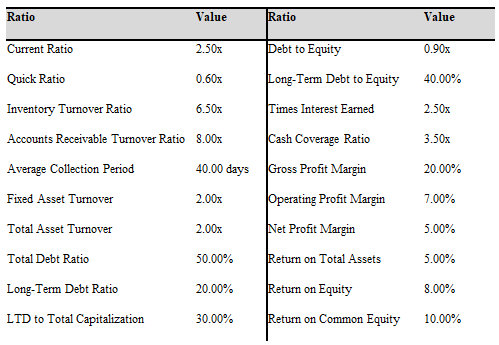Mark with a “Yes” if the following statement is true and is in Publication 1, The Taxpayer Bill of Rights. Mark with a “No” if the following statement is false or is not addressed in Publication 1.
a. A phone number to call to have tax questions answered.
b. If a taxpayer is unable to provide or to verify information, then the IRS may contact a neighbor, bank, employer, or employees in order to obtain the information.
c. Only the taxpayer has the right to represent themselves in front of the IRS.
d. Publication 1 explains what to do if an IRS employee has not provided prompt, courteous, and professional assistance to the taxpayer.
What will be an ideal response?
a. Yesb. Yesc. Nod. Yes
You might also like to view...
Sweet Dreams Corp. has prepared the following financial statements:

a) Set up a worksheet similar to the one in Exhibit 4-4, page 124, and calculate all of the ratios for Sweet Dreams Corp.
b) Verify the change in 2017 Sweet Dreams Corp’s ROE using the Du Pont method.
c) Using the Altman’s model for privately held firms and public ones, calculate the Z-score for Sweet Dreams Corp. Assume that the market value of Sweet Dreams Corp. is $1,200,000.
d) Calculate Sweet Dreams Corp.’s economic profit for these years and compare it to net income. Assume that the weighted average cost of capital is 12%.
e) Using the following 2017 industry averages, evaluate Sweet Dreams Corp.’s financial situation. Set up a ratio analysis system similar to the one in Exhibit 3-6, page 92.

The purpose of a problem statement is to find the problem cause and to define the solution.
Answer the following statement true (T) or false (F)
Over the course of a year, Suites & Sets Corporation sells household furnishings to customers to whom it extends credit. Suites & Sets orders the furnishings from The Storage Depot's warehouse, from which the items are shipped via common carrier to Suites & Sets customers. Article 2 of the UCC governs
a. all of the parties' sales of the goods. b. Suites &Sets'extension of credit. c. The Storage Depot's storage of the goods. d. each company's management of its operations.
A defendant who is only slightly liable may be required to pay the full amount of damages under which of the following?
A) the joint and several liability rule B) the collateral source rule C) arbitration D) res ipsa loquitor